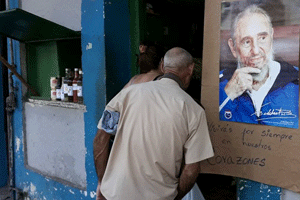
Street art in Havana, Cuba.
In a bar in Mexico City, Diego Fonseca learns that Cuba’s longtime strongman has finally died. A meditation on the passing of adolescent dreams, on revolution gasping out its life on a hospital ventilator, on how Fidel became Castro.
Now as an adult that song of my youth still makes the hair on the back of my neck stand up and makes me bite my lip and makes me raise my eyebrows and kick back with my hands behind my head as if it were not just a song, but all the Romantic revolutions that I could ever fight for.












































